Agnes Tirop: Family await justice a year on from Kenyan runner's murder
- Published
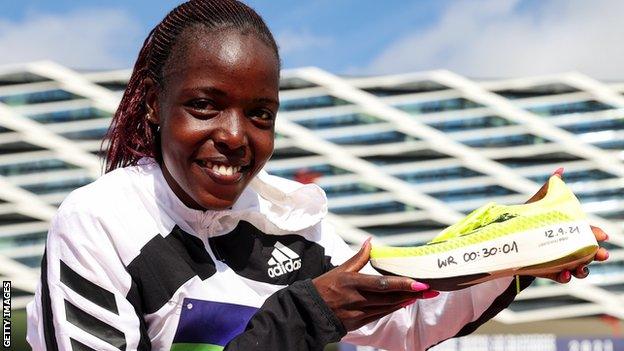
Agnes Tirop set a new world record for a women's only 10km road race the month before her murder
A year on from the murder of Agnes Tirop, her parents Vincent and Dinah are still desperately waiting - and hoping - for justice.
The 25-year-old runner was found dead at her house in Iten, Kenya, on 13 October last year, with multiple stab wounds in her neck and abdomen.
Over 12 months on from not just her murder but also her burial, the anniversary of which came last Sunday, the man accused of killing Tirop - namely, her husband Ibrahim Rotich - has yet to stand trial.
"I have been going through a lot of pain and sadness every single day since Agnes was murdered," Dinah tells BBC Sport Africa, fighting back tears.
"I am still mourning her. I haven't been alright since my daughter passed on."
It is of little surprise given the horrific nature of Tirop's death, which came on top of a promising career having been brutally cut short.
A two-time bronze medallist at the World Athletics Championships over 10,000m, Tirop had finished fourth over 5,000m at the delayed Tokyo Olympics last year.
The month before she died she set the world record, external for a women's-only 10km road race in Germany.
While the mental scars are never far away for her distraught parents, nor is the geographical location of Tirop's body, which lies next to their house.
Nearly every day Dinah cleans the grave of the world record holder where dust is continually settling, just as with the case itself.
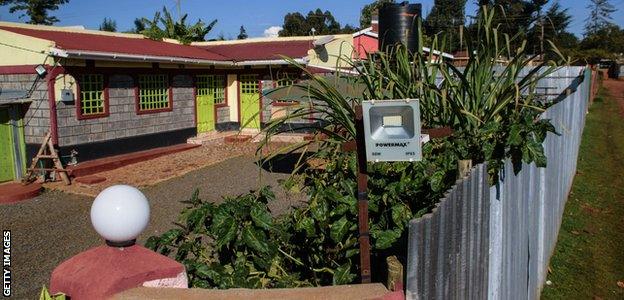
Agnes Tirop's house in Iten, a town where many of Kenya's most successful athletes are based
Rotich, who denies wrongdoing, was arrested as the prime suspect in her murder and has been in jail since then, but the wheels of justice for Tirop are moving at a different pace to the speed the athlete showed on the track.
"It's going very slowly," Vincent says. "Every time we attend the court it's just a hearing. The case is not on. They keep telling us to come back next month.
"Sometimes they say the judge is not available and I don't know why. Time is passing. It doesn't look good because one year is already gone and there is not much progress.
"We were in court in August and we were told to go back in September. Nothing happened. We were told the magistrate wasn't available. We heard from the lawyer the next date will be 11 November.
"We don't understand why the case is taking this long. The government should push to settle this matter and ensure this case comes to a close. We want justice for our daughter."
Shortly after her murder, Kenya's then president Uhuru Kenyatta urged his country's authorities to track down Tirop's killer in order to "face the full force of the law".
The homicide section of Kenya's Directorate of Criminal Investigations (DCI) did not comment when asked about the status of Rotich's case.
"Big cases drag on for so many years - that is my biggest fear," says Kenyan marathon runner Viola Cheptoo Lagat.
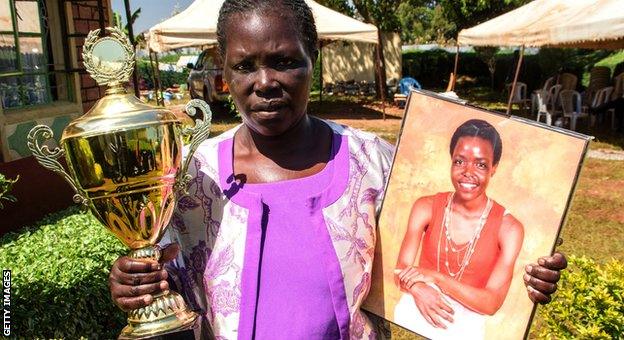
Dinah Tirop says the family are yet to recover all of Agnes' property
Ensuring Tirop is more than 'a statistic'
Tirop's murder instantly raised wider issues in Kenya, specifically surrounding domestic abuse and gender-based violence, and how to tackle them.
It also highlighted the pressures faced by the country's female athletes, and women in society as a whole.
"People started recognising there is a problem," says Lagat.
"There was this misconception that people who get abused or beaten in their house are poor people who have nothing - all they do is fight because they have too many problems. The death of Agnes was a big shock. She was very successful."
Along with fellow Kenyan athletes and Vincent Tirop, Lagat has formed a group called Tirop's Angels, external which aims to stand in unity against gender-based violence.
"It just feels like her death was just a statistic - she was just another person who died from violence," says Lagat, sister of five-time world champion Bernard.
"I don't want that to happen to Agnes. I promised myself I'm not going to sit and wait for that to happen. I understand gender-based violence and I'm not afraid to speak about this."
Tirop's Angels' aim is to offer a system of support in a country where a combination of fear, stigma and a lack of trust in the police mean the majority of cases are never reported.
"We don't want one more person to go through this," Lagat, 33, says.
"Within a very short time, we were so overwhelmed with phone calls from people going through issues."
Some of Kenya's female athletes say they have endured controlling behaviour by their husbands.
"With what happened to Agnes, the world came to light on what is happening," says long-distance runner Mary Ngugi.
"As athletes, we have a platform, and we can use that platform to change this.
"Even if we don't change what is already happening, we can help other girls to know that they don't have to be in such a relationship. They don't have to endure being used.
"We have seen Athletics Kenya doing some workshops, where they're talking about these issues but it's not that much support. I would like to see male athletes coming out and supporting it.
"When we preach more equality, and when we empower more women, this is when we are going to stop domestic violence."
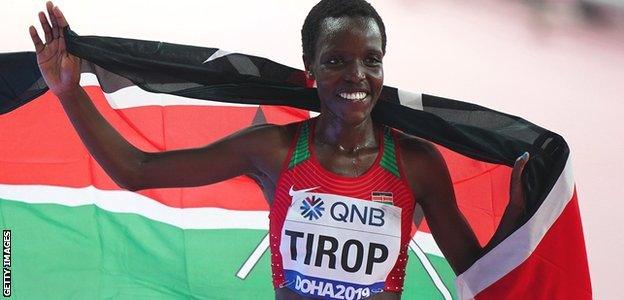
Tirop won bronze medals in the women's 5,000m at the 2017 and 2019 World Athletics Championships
Running solutions
A programme officer with Equality Now, which campaigns for improved human rights, gender equality and legislative change, says gender-based violence is "the most widespread human rights issue in the world".
"In Kenya, it's a huge problem, deeply rooted in power dynamics," says Equality Now's Peninah Masore.
Figures supplied by Kenya's Ministry of Health earlier this year disclosed that 45% of women and 44% of men aged 15-49 have experienced physical violence since age 15.
The main perpetrators of physical violence against women are husbands, whereas the main perpetrators against men are parents or teachers.
Meanwhile, 14% of women and 6% of men in the same age bracket report having experienced sexual violence at least once in their lifetime.
Last year former President Kenyatta stated he wanted to end gender-based violence in the country by 2026.
"There has been that knowledge that the state actually sees this as a huge issue that needs action," Masore adds.
"The government needs to ensure that they're putting in place measures to prevent gender-based violence. We need to have structures to support people, with safe houses and people in the justice chain knowing their mandate and responsibility."
In a bid to combat the issue, Ngugi has established a women's-only running club - the Nara Track Club - where she is encouraging more females to become running coaches.
"When we are young athletes, that's when we started being recruited by people," she says.
"Maybe some coach or guy says 'I'll support you in your career', because they know it's an investment - this girl is going to be winning - and it's a lot of money involved.
"That's when people start manipulating them, when you're young and naive you just follow what people say.
"I feel the more female coaches there are, then girls will be more safer because they're surrounded by women."
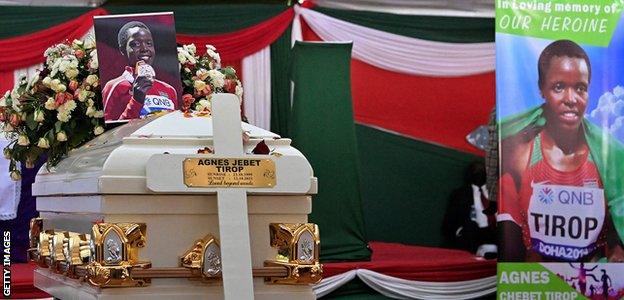
Tirop's funeral and burial were held in Kapnyamisa village on 23 October last year
Filling the void
In Mosoriot, Nandi County, Vincent and Dinah's living room highlights the success their daughter had as an athlete, with her medals hanging across the four walls.
"We feel joy every time we see those medals," Vincent says.
"We thank God for the medals she brought and the efforts she put in to bring them and fly the Kenyan flag. She was an asset to the country and she would have added some more."
Looking around the room as a proud father, Vincent briefly breaks into a broad smile.
But the sad reality is that Tirop's murder has also left her parents struggling financially, as her success helped pay school fees for two younger siblings, as well as nieces and nephews.
They also now have to cover the cost of travelling to repeated court hearings in Eldoret, over half an hour's drive away.
"Since she passed on, life hasn't been easy," Vincent says.
"We are struggling to make ends meet and it's very hard because we are jobless. Our children need school fees and other needs."
In their quest for justice, the family also hope to recover some of Tirop's assets.
"We want justice to be done because we haven't received all of Agnes' property - we have just received a small portion," Dinah says.
"Agnes put in a lot of work but most of her property, such as buildings, is out there."
Still grieving, Vincent and Dinah have not yet deleted their daughter's number from their phone contacts because they want to keep seeing her name.
The eventual resolution of Tirop's murder trial may bring some form of closure to her family, but the campaign to eradicate gender-based violence has much further to run.
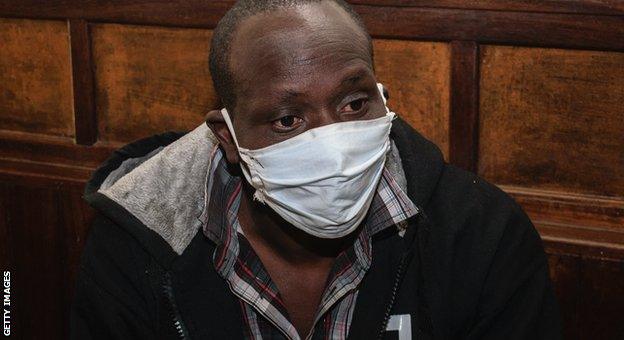
Ibrahim Rotich, Agnes Tirop's husband, is accused of her murder and awaiting trial